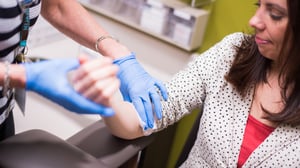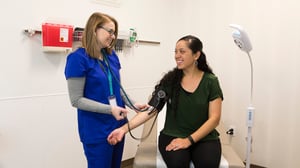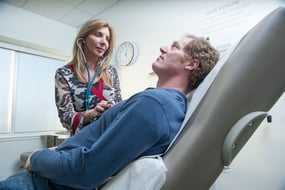The COVID-19 pandemic exasperated America’s mental health. Now, more than 4 out of every 10 adults in our country report symptoms of anxiety or depression. But, if you’re struggling with depression or know someone who may be, all of the statistics fade into the background. Experiencing untreated depression can be a consuming and debilitating experience.
Fortunately, there are a number of things that can be done to alleviate depression and its symptoms. Nurse Practitioner Heather Helms sheds light on depression and how a screening and other practical tools can help.

Q: What can depression look like, and what are some common symptoms or warning signs that members can look out for in themselves or loved ones?
Heather: I would say take notice if you are not feeling like yourself. Are you grouchy, feeling flat, or sleeping too much (or not enough)? Has it been going on for at least two weeks? Be mindful of a change in typical activity, mood, or lifestyle — or something else out of the ordinary. If somebody points out, "Hey, you're not like you normally are,” it’s wise to hear them out.
Q: What's involved in a depression screening?
Heather: At Vera, we use the PHQ-9 screening which has nine easy-to-answer questions. Some examples include:
- How are you feeling?
- Are you finding pleasure in doing every day things?
- Do you have a hard time falling asleep or staying asleep?
- How's your energy?
- How's your appetite?
This brief screening gives us an idea of how a member is doing and feeling.
Q: How effective is the screening?
Heather: It's really effective. And it has been around a long time. It’s so effective, we recommend screening every year.
If a member makes an appointment and tells me they have a mood-related issue, I'll ask them to fill out the screening questionnaire prior to our visit. And if that member comes back and speaks with me another time, I'll have them fill it out again. This helps me see if their depression is getting worse, and these markers point to important changes.

Q: What are some common roadblocks to addressing mental health?
Heather: People often say, "Oh, I don't have time, or I haven't had treatment my whole life. Why do I need it now?” Some people worry that they will be judged for not having done this sooner, or they worry about being judged for even having one session with a counselor.
Other people will say, "Oh, well, I have a good support network." But that's not quite the same as meeting with the healthcare clinician. Health professionals can help equip you with the tools to deal with depression and rise above it, rather than stay where you are — or get worse.
And then there's that topic of shame. People don't want to admit they have a problem. But there’s no shame in needing help and support — and that's why we're in this business. We’re here to support what's best for you and to help you grow.
If you're having suicidal thoughts, are worried about a friend or loved one, or would like urgent emotional support, call 911 or The National Suicide Prevention Lifeline at 1-800-273-8255. Their hotline is answered 24 hours a day.
Q: If a member sees a loved one is struggling with depression and could benefit from a proper screening, what are some tips for expressing concern without making that person feel shame or guilt?
Heather: It’s best to bring it up to that friend or loved one when you're alone with them, and not in a public conversation. Then it’s just about showing you care. "Hey, I've noticed you're not the same lately." Or, "I've noticed you've been really tired or really down lately." That you're caring about that person enough to talk to them shows that you just want what's best for them.
Q: Are we wrong to assume depression only occurs in adults? Can you share more about the age ranges that struggle with depression?
Heather: You can be depressed at any age — and depression can come from circumstances, biology, or physiology.
One great thing about a behavioral therapist is that they equip members with the tools to recognize depression and identify it, talk about it, and move forward, rather than relapse or let it recede into the background like people often do. There's no reason to suffer in silence.
Q: What every day or practical steps can people take in addition to screenings to promote self-care and optimal mental health?
Heather: I want to credit Bethany, a Vera mental health provider, with this answer:
- Have a concrete plan to deal with difficult situations — and share it with your support system.
- Do things that promote pleasure and accomplishment every day.
- Make time to check in with yourself.
- Pick two or three things that help and do them consistently.
- Explore medications with a healthcare provider or therapy with a trained professional.
We want people to talk and get help. It’s a simple (but really important) step. Anybody can come in and get a checkup, and this quick depression screening is just nine questions long. Know that the entire Vera team is honored to support members in all areas of their health.
Schedule an appointment to talk with your Vera provider at patients.verawholehealth.com.
Sign up
Join our email list to receive the latest open positions, Vera Careers news, and more.




